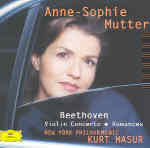Normally you’d expect a performance of the Beethoven Violin Concerto’s first movement lasting 27 minutes and nine seconds to be on the slow side. Timings, however, are deceptive, and especially so in the case of Anne-Sophie Mutter’s highly anticipated adult remake of the work with which as a teenager she made her recorded concerto debut under Herbert von Karajan. The extra minutes turn out to be the sum total of Mutter’s frequent tempo distentions, ritards at phrase ends, and other implements of interpretive graffiti. She taints the purity of her opening broken-octave entrance with the most cloying vibrato since Mantovani, telegraphs the sudden piano marking at the downbeat of measure 93 with a giveaway ritard in the previous measure, and archly pulls back at the peak of the ascending scale (measure 100 into 101). Karajan’s Beethovenian influence lives on in the buttery legato phrasing Mutter substitutes for Beethoven’s specifically notated staccato at measure 151, and she affectedly inflects the subsequent triplet passages as if to say “who cares if the first violins carry the melody, why should I accompany them?” Notice, too, in the development section, how Mutter differentiates the repeated quarter-note A-sharps in a titillating rather than expressive manner and distends the crucial cadence between measures 195-198 by a superfluous, tawdry broadening of the triplets. And if belaboring the obvious is your thing, dig how Mutter milks the transition into the subsequent trill: subtle she ain’t!
I don’t sense that Mutter is as much a willful soloist as a bored musician for whom this concerto no longer holds challenges. But the remaining movements are better. Kurt Masur rightly resists the usual temptation to transform the central Larghetto into a Largo, and sets up an eloquent framework where Mutter’s scaled-back sonority and minimum use of vibrato create a haunting effect. But her intonation is atypically erratic (the ascending G major arpeggio at measure 12 will make you wince). By contrast, Mutter’s full-throated vibrato is just right for the Finale’s playful lilt, and there’s lots of genuine interplay between soloist and orchestra. She plays the two Romances with all the stylish aplomb, proportioned phrasing, and taste these underrated gems require, and she’s gorgeously supported by Masur and the New York Philharmonic. Are the Romances alone worth the cost of this disc?
































